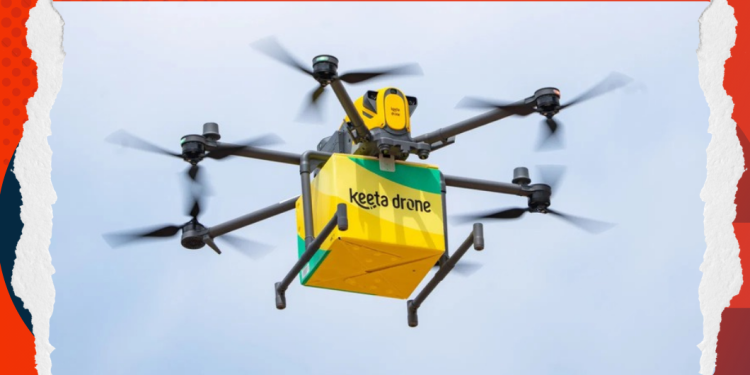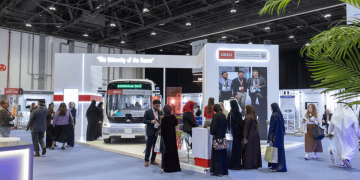Dubai will transform into the world’s largest drone delivery hub within five years, as Chinese tech powerhouse Meituan’s subsidiary Keeta Drone announces plans to blanket 70% of the emirate with autonomous aerial logistics services by 2030.
The ambitious timeline emerged during Dubai Airshow 2025, where Dr Yinian Mao, Vice President of Meituan and President of Keeta Drone, outlined how Dubai’s progressive policies make it the perfect testing ground for next-generation urban delivery systems.
First Mover Advantage Puts Dubai on Drone Delivery Map
Keeta Drone already holds Dubai’s first Beyond Visual Line of Sight (BVLOS) commercial drone delivery license, granted by the Dubai Civil Aviation Authority (DCAA) in late 2024. This regulatory breakthrough opened skies previously restricted to manned aircraft.
The company operates four active delivery routes in Dubai Silicon Oasis, connecting residential areas with commercial zones through autonomous drones. In October 2025, Keeta expanded operations to Nad Al Sheba, launching food delivery services between Avenue Mall and the Grand Mosque landing pad.
Dr. Mao emphasized Dubai’s regulatory environment as the key factor behind choosing it as Keeta’s first international base. “Progressive policy is the first step for drone delivery to take off,” he said during his keynote speech titled “From Policy to Progress – Building the Skyways for Urban Logistics.”
Desert-Proofed Technology Tackles UAE Climate Challenges
Keeta’s fourth-generation autonomous drones are equipped with specialised engineering for Dubai’s harsh desert conditions. The aircraft maintains reliable performance in temperatures exceeding 50°C, sandy environments, and high winds that typically ground conventional delivery methods.
Safety systems include AI simulation technology that can run millions of training cycles to identify potential hazards. This virtual testing approach reduces the need for real-world risk assessment while ensuring operational safety standards.
The drones connect with automated ground support units for seamless handoffs between air and surface logistics. This integrated approach enables contactless delivery while maintaining the speed advantages of aerial transport.
Sustainability Goals Align With Urban Air Mobility Plans
Drone delivery supports regional sustainability targets by reducing ground vehicle emissions and traffic congestion. The contactless delivery model also addresses post-pandemic consumer preferences for minimal human interaction.
Dr. Mao highlighted how aerial logistics creates “greener and more efficient urban environments” compared to traditional delivery truck fleets. Electric-powered drones produce lower emissions per delivery than fossil fuel vehicles, especially for short-distance urban routes.
Dubai’s smart city initiatives incorporate drone corridors and rooftop landing infrastructure to support the growing aerial delivery network. These developments position the emirate as a global showcase for sustainable urban logistics.
Meituan Brings Proven Chinese Experience to the Middle East
Keeta Drone operates 53 delivery routes across major Chinese cities, including Shenzhen, Beijing, Shanghai, Guangzhou, and Nanjing. By late 2024, Meituan drones completed over 450,000 successful delivery orders.
The Chinese experience offers operational templates for Dubai’s expansion, encompassing route optimization to customer interface design. Meituan’s food delivery platform integration provides proven technology for merchants’ onboarding and order management.
International expansion through Dubai creates a bridge between Asian drone logistics leadership and Middle Eastern market opportunities. Success in Dubai could accelerate Keeta’s expansion across the Gulf Cooperation Council region.
The 2030 timeline represents more than ambitious planning – it signals Dubai’s commitment to becoming the world’s first major city with comprehensive drone delivery infrastructure. As Dr. Mao noted, “We’re starting to help achieve that vision and make this vision real.”














